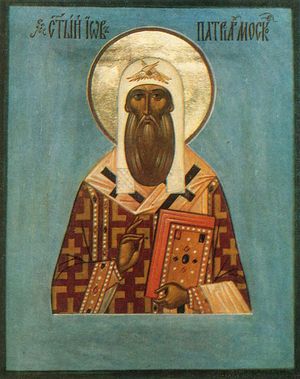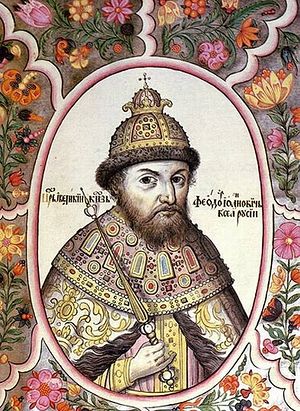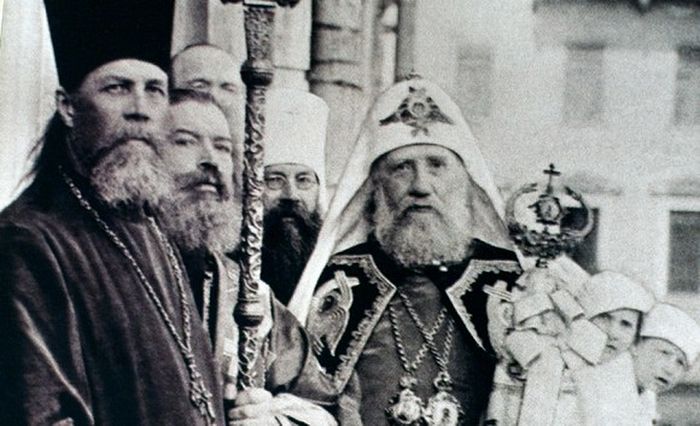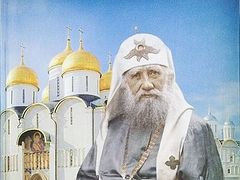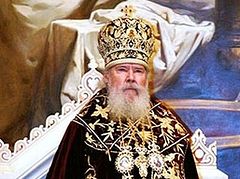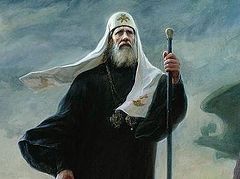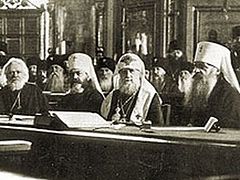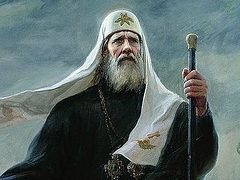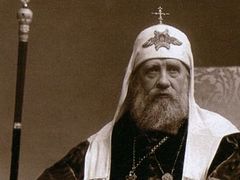This speech was delivered at the conference on Slavic literature and culture, taking place in Moscow, on 16 May 1990, shortly before the Local Council of the Russian Orthodox Church elected a new patriarch on June 7, 1990.
Nowadays there are certain forces that are most active in the Church and around it. These forces are trying to impose their views on what, in their opinion, is the right, true way the Church should develop, how Church life should be “changed” or “reorganized”. Recently, there have appeared myriads of articles moralizing, denouncing and instructing the Church. However, its authors are completely ignoring the fact that the Church lives by different laws from those of the world; it is ruled not by people or organizations, but the Almighty Lord, Who created Heaven and the earth.
In 1989, the Bishop’s Council canonized the Holy Patriarch Job, the first patriarch of the Russian Orthodox Church, and the Holy Patriarch Tikhon, the first patriarch after two hundred years of the synodal era. The media’s reaction towards it, by the way, was controversial. Nikita Struve wrote in an editorial of the Bulletin of Russian Christian Movement: “One may regret that the circumspect hierarchs of the Russian Orthodox Church canonized Patriarch Tikhon together with humblest Patriarch Job, who hardly merited the attention of history and the Church.” The Russian believers could scarcely share the sorrow expressed by the Bulletin’s chief editor about the fact that the Russian Church had a new saint. However, what deserves our sorrow is that even an editor as renowned as Nikita Struve sees nothing but political conjuncture in things that (like everything in the holy Church) are manifestations of the Holy Spirit and the deepest patterns of the Church community’s life.
The Russian media welcomed the event with rather benevolent articles; they admired the great contribution these primates made to the Russian spiritual treasury, their patriotic ministry and multitudinous achievements, which caused the glorification, as well as the 400th anniversary of the Russian Patriarchate. It was all very touching, though it very much reminded one of the usual stereotypes and obviously had nothing in common with Church tradition.
It’s idiosyncratic of the Orthodox Church that glorification is not an encouragement or posthumous award. It’s neither a way of recognizing a Church hierarch’s achievements nor an attribute of pompous ceremonies. The glorification of a saint is, first of all, a call for service.
No matter what historic period the glorification takes place in, it always happens at a time when that spiritual paragon of life in Christ can give assistance from the triumphant Church of Heaven to our earthly, militant Church.
It has already been mentioned that both Patriarch Job and Patriarch Tikhon lived and served in times of troubles. The Lord granted patriarchs to Russia when the state authority weakened and was no longer able to duly govern that Orthodox country. However, it’s not the only amazing thing that the two primates had in common.
Both of them lived through civil wars. Unleashed by Moscow’s foes and supported by traitors, the False Dmitry’s allies, the seventeenth century, civil war and Polish-Lithuanian invasions would have abolished Orthodoxy in the country. In the first days of the twentieth century, civil war and invasion coincided with the first days of Patriarch Tikhon’s ministry. That war was an attempt to break all relations people could have with God, to fully eradicate the Orthodox faith.
Two tsars, whom the Russian people venerate as saints, established the Russian patriarchate, both the initial and restored ones. These tsars are Feodor I and martyr Nicholas II.
Tsar Feodor was an amazing, benevolent person. He was the embodiment of a saint on the throne. He dedicated all his time to prayer and contemplation and was generous to everyone. Church services were the meaning in his life. And the Lord didn’t darkened his reign by unrest or troubles. They began after his death. The Russian folk loved and sympathized with him more than any other tsar. People venerated him as blessed and called him the “sanctified tsar”. It was not without merit that his name could be found on the list of Moscow saints shortly after his death. People could see his wisdom, born from a pure heart and wisdom that the “poor in spirit” are so rich in. Alexei Tolstoy created exactly the same image of the tsar in his tragedy. Those from abroad, however, saw the tsar in a different light. Making notes about Russia, foreign travelers, diplomats and spies (such as Pearson, Fletcher or Per Erlesund) called him a “quiet idiot”, to put it mildly, while the Polish statesman Lew Sapieha claimed, “We shouldn’t be saying that this tsar has little intellect; I’m convinced that he has none”.
Similar misunderstandings, found among those who are far from Orthodoxy, define their attitude towards Nicholas II. Let us here avoid recalling all the dirt thrown on him and his family. The nation venerates and has always venerated the Tsar-martyr as a saint.
Patriarch Job wrote the excellent “Tale of Tsar Feodor Ioannovich of honorable life”. Patriarch Tikhon responded to the death of the Russian royal family with a homily, denouncing and unveiling their true murderers.
The two patriarchs witnessed such landmark events of Russian history as the collapse of two great dynasties. Tsar Feodor, the last of the Rurik dynasty, died during the lifetime of Patriarch Job; the House of Romanov ceased to reign when St. Tikhon was patriarch.
Two innocent tsareviches were killed in the lifetime of both patriarchs, and these events were pivotal for the nation’s moral life. Tsarevich Dmitry was stabbed to death on May 15, 1591 in Uglich. Tsarevich Alexei was murdered on July 17, 1917 in Ekaterinburg.
Both patriarchs endured sieges of Moscow and the outrages perpetrated when the invaders occupied the Kremlin. St. Tikhon was elected Patriarch as the Kremlin was under artillery fire; and during St. Job’s ministry, that same Russian heart, the Kremlin, was defiled by the Polish invaders and the False Dimitry.
Another burden the two patriarchs had to endure was unrest within the Church. They both were excommunicated, and new primates took their place. In 1606, the Catholics, promulgating Uniate ideas in Russia, and the bishops, who had pledged allegiance to False Dmitry, managed to make the false Patriarch Ignatius the Russian primate. By the way, this pseudo-patriarch fled Moscow and joined the Uniates, when his patron, the false tsar, was dethroned.
The rebels beat and humiliated Patriarch Job in the Kremlin’s Dormition Cathedral, pulling off his clothes. But despite the threats, he refused to pledge allegiance to the False Dimitry. Taking off his panagia and putting it beside the Vladimir icon of the Theotokos, the Patriarch said, “Our Lady, Blessed Theotokos! This holy panagia was granted to me in this place, it helped me to fulfill the word of Your Son and our Lord. For eighteen years, it has helped me to preserve the unity of our faith. And now I see that for our sins Russia must endure these calamities, while lies and heresy triumph. O Most Holy Theotokos, save and preserve the Orthodox faith, hearken to our prayers and bring them to Your Son!”
When Patriarch Tikhon was at the head of the Russian Church, it was undermined by the Renovationist schism. Just as it was 300 years ago, a number of bishops betrayed the Church and even sunk to fiercely condemning the Patriarch. Some of the homilies and articles written by the Renovationist hierarchs have been preserved until today. On February 17, 1924, Bishop Antonin (ordained before the Revolution) wrote in Izvestia newspaper, “Tikhon is a big priestly effigy, full of witchcraft, mediocrity, magic, cunning and gold coins. At every service, he creates smaller effigies; they put on brocade robes and golden pots, they bellow, whirl around and flail.” Then follows his blasphemy against the sacrament of the Holy Eucharist...
As the renovationist was writing his discourses for Izvestia, Patriarch Tikhon was imprisoned, and the holy martyrs, the bishops loyal to Orthodoxy, were suffering excruciating tortures and prosecution.
However, God not only fortified the Russian people through their patriarchates when the country was on the brink of times of troubles, but also supported the nation through the intercession of the Theotokos. The Kazan Icon appeared shortly before St. Job was elected patriarch. The Reigning Icon was miraculously found in the village of Kolomenskoye on March 2, 1917, the day that Tsar Nicolas abdicated, and several months before St. Tikhon was elected patriarch. It is evident that these two images are key not for just some particular city or region, but for the whole Church, for the whole country. Patriarch Job and Patriarch Tikhon were the only Russian primates to anathematize the revolutionary authorities, because those authorities were treating the Church and the nation contemptuously.
Both patriarchs were held in custody: His Holiness Patriarch Job was held in Staritsa Monastery, and Patriarch Tikhon was held in Lubyanka prison and Donskoy Monastery.
Both patriarchs had to face the phenomenon of impostors. The deception of False Dmitry is well known to everyone. We know the methods he used to seize power and how his life ended. The filthy treachery of those commanders who pledged allegiance to False Dmitry is also well known. It’s hardly possible to imagine how difficult it was for Patriarch Job, when almost all of the bishops, his brothers in Christ, were trying to persuade him to succumb to pressure for the sake of a utopian Church peace, and for the sake of their personal security. The Patriarch was able to resist this temptation, although when brought to Moscow, the tsarevich’s mother, Nun Martha, publicly recognized False Dmitry as the true tsar; her fear made her pronounce that lie. Patriarch Job remained resolute; he preferred persecution and exile to false testimony.
History with its false tsars repeated itself in the lifetime of St. Tikhon.
When we fight evil, our success is defined not by the victory itself but by the struggle for truth till the end. Patriarch Tikhon never hoped for outward success; such hopes are not characteristic of a Christian. He who endures to the end shall be saved (Mk. 13:13). Following the example of patience set by the holy patriarchs, Russian people have gained patience; and as we can see, patience and standing for the Orthodox truth are what have been placed in the foundation of our salvation. It is the Russian destiny, the cross placed on our country a thousand years ago.
I’d like to say a few words about St. Tikhon’s pastoral speeches. They possess a quality typical of the words of prophets, inspired by God; they are imbued with life and wisdom not only for the author’s contemporaries, but for the whole Church in all times. Here are two small citations: “A terrible exhausting night is still wearing on in Russia, and no joyful dawn penetrates it. Russia is in grave torment, and there’s no one to heal it... Sin has scattered around our land, and weakened the spiritual and physical strength of the Russian people. Sin, according to the prophet, made God take away the stock and the store, the whole supply of bread, the mighty man and the man of war, the judge and the prophet, and the diviner and the elder (Isaiah 3:1-2). That poisonous source of sin produced the great temptation of gaining sensual earthly pressures, to which our people yielded, forgetting about the one thing needful” (1918).
“All this devastation and shortages are a consequence of our willingness to build the Russian state without God. Have we ever heard our leaders mention the name of God in their multitudinous meetings, conferences, parliaments and councils? Never. They rely exclusively on themselves; they wish to make a name for themselves, unlike our righteous ancestors, who brought the glory not to their names, but to the name of God. Therefore He who sits in Heaven shall laugh at our plans and hold us in derision. The Lord is righteous, for we rebelled against his commandment (Lamentations 1:18)” (1918).
The patriarchs’ care for the people of the Church is another part of the their highest ministry. The obligation was imposed on the patriarch in the sixteenth century and reaffirmed during the Council of 1917, as a specific article among many other obligations the primate was to fulfill. Often persecuted and incarcerated for this, the two patriarchs honored this obligation to the full. Their fatherly love, prevailed over all, “For you, the people of Russia, deluded and unhappy, my heart is full of mortal sympathy,” Patriarch Tikhon said.
The two patriarchs’ lives are interwoven, as well as the fates of their times, and the fates of our time and today’s Church; which, by the word of God, called these two saints for the ministry. In the rite of ordination are the following words: “God’s grace always heals the feeble and fills those who become poor...” When our earthly Church becomes poor, when the Church is no longer in peace due to our weaknesses, God gives us saints who are able to support us with their ministry and prayers. And today seems to be such a time.
If, by the Providence of God and for our sins we must experience the ordeals Sts. Job and Tikhon had, we know that by God’s Providence and for our salvation, we have our heavenly intercessors in times of trouble—St. Job and St. Tikhon. Today we pray to them for His Holiness the Patriarch that God would grant that he “rightly teach the word of Christ’s truth”, strengthen him in his prayers, and care for God’s people; give him power to bear the cross of his ministry and repeat the words of Patriarch Tikhon, “Henceforth, I am entrusted with the care for all the Russian churches, and what awaits me is the gradual dying for them all my days.”

